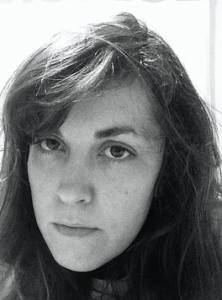
Interview by Matthew Walsh
 Amber McMillan’s recent collection of poetry, We Can’t Ever Do This Again was released with Wolsak and Wynn last year. Split into three sections, the poems cover a lot of emotional ground. It’s easy to say that there is something “human” about these poems, as they cover a lot of emotional ground. Dark, funny, insightful, these poems are brave to go where they want, crafted with concise detail and dream-like imagery. McMillan’s work has appeared in CV2, Arc Poetry Magazine, subTerrain, Best Canadian Poetry and others. I had the pleasure to email back and forth with Amber, and ask her about sleepwalking, her first memory of poetry, and her new project, The Woods: A Year on Protection Island.
Amber McMillan’s recent collection of poetry, We Can’t Ever Do This Again was released with Wolsak and Wynn last year. Split into three sections, the poems cover a lot of emotional ground. It’s easy to say that there is something “human” about these poems, as they cover a lot of emotional ground. Dark, funny, insightful, these poems are brave to go where they want, crafted with concise detail and dream-like imagery. McMillan’s work has appeared in CV2, Arc Poetry Magazine, subTerrain, Best Canadian Poetry and others. I had the pleasure to email back and forth with Amber, and ask her about sleepwalking, her first memory of poetry, and her new project, The Woods: A Year on Protection Island.
What is your first memory of poetry?
For a year during grade 5, I attended an all-girls private school called Norfolk House (they’ve since changed the name to Glenlyon Norfolk School and they now allow girls and boys in the same class). My teacher was Mr. Smith and he was a very serious and stern educator. He was tall and old and had a deliberately authoritative beard, like Darwin. I could tell he was frustrated with me because I wasn’t a serious child. I liked to tell jokes in class and draw pictures instead of paying attention. One day, while studying the poet William Blake, I made a paper airplane and threw it toward my friend Susan, a few desks over. Unfortunately the plane gained unexpected momentum and ended up flying up into the air, causing a real stir in the classroom. We were in the middle of “Tyger, Tyger” so you can imagine Mr. Smith’s irritation. Moments after the paper plane finally landed, Mr. Smith rose slowly, and as terrifyingly as possible, asked me to meet him outside our classroom immediately. Outside, Mr. Smith loomed over me and instructed me that my punishment for misbehaving was to return to the classroom and, in front of the everyone, read “Tyger, Tyger” from our course book. I went back into class and read the poem, blushing and tripping over every line while the class stared blankly back at me. I thought I was going to die.
Who did you start reading when you began to write poetry?
When I began to think about poetry in a serious, unacademic way, I read Dorianne Laux, in particular her book Facts About the Moon for her severity, Michael Longley for his style, and Jack Gilbert for his heart.
There are several references to sleepwalking in the collection, is this something you have experienced?
It’s not something I’ve experienced, no, but it is something my youngest brother, and now my daughter have experienced, and because of that, I guess I’m a little preoccupied with it. When my brother Taylor was young, say from age four to about age ten, he would regularly wake up during the night and have to be soothed back to sleep. Once while I was babysitting, he woke up in full, inconsolable fear, screaming and running in circles in his room. I ran in, turned on all the lights and tackled him to the ground, holding him there until he woke up and stopped screaming. Later he said that he had been dreaming about being chased by a bear, so his reaction was totally understandable. I think it’s amazing that our consciousness can be that fluid; that we can be so thoroughly convinced of something happening that isn’t happening. That a dream can have enlisted our minds and bodies to such a degree and with such intensity, that we recall it even years later.
Have you ever experienced supernatural activity/been haunted by something?
No, I don’t think so. But I like the idea as a metaphor in terms of what it reveals about ourselves. For example, if a person tells you he saw a ghost or visited a psychic, that means something about the way he perceives things, about his interaction with the world.
 On the back of your book David Seymour describes your poems as pseudo-magical. The poems definitely vary in tone and sound, but how would you describe your poems?
On the back of your book David Seymour describes your poems as pseudo-magical. The poems definitely vary in tone and sound, but how would you describe your poems?
These poems are attempts at describing and coming to terms with the inconsistencies and disappointments of growing up, of pulling together your own history, of losing in love. I don’t think these are poems that try to make things magical, but I do think they’re working for some basic and livable compromise between things as we hope for them to be, and things as they turn out to be.
I really like the poem “Renfrew, Ontario, 1988”. What inspired that poem?
I wrote that poem about the particular event of witnessing a cow being shot between the eyes when I was young. I hadn’t seen anything like that before then, so it made an impression. I don’t mean to sound pat, but in retrospect, it was a significant and lasting example of moral ambiguity, a concept I didn’t even know existed at the time. My uncle shot the cow because it was sick and starving itself. He was a very nice man and he shot the cow without a moment of hesitation as to its rightness or wrongness. He was confident about what needed to be done and I was mesmerized by that. I still am to a certain extent.
How long did this project take? Was it something you left and came back to?
I started the poems in this book in 2011 and published it in 2015, so about four years or so. I don’t remember ever leaving it; I just kept writing it, a poem a month on average until it was long enough to be a book. The last poem in the book is also the last poem I wrote for the book only a few months before it was printed.
Did any poem come to you in one sitting?
The ones that I wrote to a single person did. You see, I wrote them for a man as kind of love letters, the benefit of which is that I never imagined they would be read by anyone else. I wasn’t self-conscious about them in terms of “is this a good poem” because my singular aim was to make a specific kind of impression on him alone. Those are the ones in the book that I feel the closest to, even though they came the quickest.
Did the collection naturally lend itself to be split into parts?
I don’t know. I think it’s easier to provide breaks in a poetry collection so there are built-in starting and stopping places to guide a reader. Maybe too, any kind of extra organization or logic in a book of poetry is a good thing.
How many titles did you go through before you settled on the current title?
For a long time the book was untitled and I had no good ideas for a title, which I think had something to do with the fact that I didn’t really know what this book was about. I mean, I knew it was about love and death, but what isn’t about love and death?
It wasn’t until the book was more or less finished, and my boyfriend called me from Vancouver, having been away for three days, and said of our separation, “We can’t ever do this again.” He was joking a little in this context, but I also saw how that sentiment sympathized with the book’s so-far-unacknowledged aims. I thought it was a perfect title and I stole it.
What are you currently working on?
I’m just finishing a chapter in a book called The Woods: A Year on Protection Island which will be out this fall with Nightwood Editions. It’s a book about living in a really small community of only a couple hundred people. A community which also happens to be isolated on an island, accessible only by boat, and so small that you can walk its entire length in under thirty minutes.
Where is the most comfortable place to write?
At home, where I’m close to the fridge when I get hungry, the bathroom when I have to go, and my bed if I want to lie down. For these reasons, coffee shops are the worst. Also, I like to listen to songs when I write, and for some reason, I like that to be a private thing. At home.
Matthew Walsh is a writer from Nova Scotia. His work has appeared in Arc, Carousel, Johnathan, The Quotable, The Found Poetry Review, Carousel and TAR.